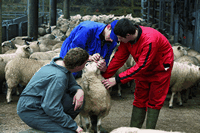College Farm Focus: Duchy College sets sights on the food chain

 A new £4.7m food chain centre (background) proves Duchy College’s commitment to the sector.
A new £4.7m food chain centre (background) proves Duchy College’s commitment to the sector.
Down a long lane in the county of Cornwall stands England’s fastest growing farm college. And its growth stems from a redoubled commitment to farming, highlighted by a new £4.7m food chain centre, plans for a new 350-cow dairy unit and a deep involvement with life-long learning for the whole industry.
On a grey winter’s day, dampened by the south-west’s own special brand of “liquid sunshine”, Duchy College’s Stoke Climsland campus seems like any other. But the quiet atmosphere belies a connectedness with the industry that is helping it hit record student numbers and a rocketing involvement with the region’s land-based industries.
Clearly, Objective 1 EU funding has helped a lot, as has the restructuring of agricultural education in the area, including the closure of Seale Hayne College in Devon. But Duchy’s real success stems from its unbridled enthusiasm to deliver what the industry wants, with no history to hold it back.
“We aim to serve the industry with what it needs, and help people whether that is school children, new entrants to the industry or those that are seeking to hand their business on,” enthuses Principal Andrew Counsell. “We are about lifelong learning – through residential study, on-farm courses, consultancy or demonstration.”
The college drifted from its rural roots once, he admits. “But we’ve rebuilt a strong farming focus and it has brought huge interest in the area for us as a specialist land-based college.” Full-time students now number 1500 a year, with over 25,000 part-time enrolments over the past five years. The goal is 2000 students per year within three years and 30,000 part-timers over the same period.
Leadership
So what drives that success? “We need to give the industry clear leadership, and at Duchy that means leadership in everything from growing to selling,” the principal explains. That’s why £4.7m is being invested in the Agri-Food Innovation Centre.
“It will not be a demonstration hall, it will be the real thing, where businesses can evaluate processes, test equipment and work on product innovation,” says research director Phil le Grice. “Learning will be around real product flows, with real hygiene and quality control. It will look like and feel like a real food factory.”
It will be complemented by a Food Innovation Service, funded by the Gatsby Foundation, providing technical advice to smaller food companies.
The unit also highlights Duchy’s desire to smash the divide between formal student teaching and less formal industry training. “It is all learning, life-long learning, which is so vital for today’s industry,” notes Mr Counsell.
Flexible learning is a real mantra, with modules timed to suit specific audiences. “Farmers sometimes think teaching will be with students, but all too often it isn’t. We cater for flexible delivery, blending the learning with the day job as necessary.”
Indeed, learning by seeing and doing runs through all Duchy does. It means many farms and enterprises beyond the college’s own farms are used.

Partnership
“We don’t feel constrained to teaching around what we have on our own farm. We go beyond that,” explains farm manager Richard Griffiths. The college has created poultry and pig food chain courses in partnership with local producers and processors, for example. So far 150 farmers have benefited. Electronic livestock identification is another area for industry involvement.
Having said that Stoke Climsland home farm provides a commercial backdrop through a 250-cow dairy herd and 200-ewe Easter-lambing flock, plus some cereals. “We’ve always been actively involved in trials, running split fields to investigate anything from cultivation techniques to fertiliser regimes, and variety choice to spray options, whatever farmers ask for,” says Mr Griffiths.
New dairy
All the farm’s accounts are available for scrutiny, which will prove particularly interesting as a new dairy unit is developed next year. “It will be completely transparent, that’s where the learning lies.”
Further messages to emerge will be around efficiency of operation and environmental impacts, something DEFRA is part-funding through its Catchment Sensitive Farming programme, which Duchy is already involved with.
The newly created Rural Business School extends that principle, offering a host of services to the industry, explains head Richard Soffe. Its activities include the Farm Business Survey, which Duchy is now running in the south-west, with support from Exeter University.
Rural tourism is a particular focus, given that the south-west’s 22m tourist nights per year is second only to London.
In the future environmental issues and renewable fuels are seen as big agendas. Already all the College’s vehicles run on bio-diesel and the Rosewarne campus is heated by a boiler fed with fuel from a 45 acre block of Miscanthus elephant grass.
Realising such ambitions is made easier thanks to Duchy’s place in England’s largest college group, the seven-college, £70m turnover Cornwall College Group. “It provides real synergies, giving us the critical mass to make things happen,” says Mr Counsell.
In particular it gives Duchy scope to expand its role beyond Cornwall, offering a training and development service across the south-west.
Schools focus
And the plans don’t end there. The college’s forward facing focus is highlighted by an initiative to get Cornwall’s 33 major schools involved in farming 1 acre of Duchy College Farm each. “We would like to see 2000 youngsters visiting each year, with the produce from their acre going through our food chain centre. It would provide a tremendous learning opportunity around sustainability and the environment,” Mr Counsell concludes.
| DUCHY PROFILE-COLLEGE FACTS |
|
Related Links:
